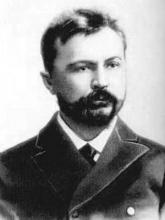Sergey Nikolaevich Bulgakov (1871-1944) was a Russian religious philosopher, a professor, theologian, economist. In 1901-1906 he was a lecturer in Kyiv Polytechnic Institute. From 1906 he held the position of the associate professor in Moscow University, in 1911, as a protest against the abolition of university autonomy, he resigned. From 1918 he was engaged in religion. He emigrated in 1923. In 1925-1944 Bulgakov held the position of dogmatic and the dean of Russian Theological Institute in Paris.He was involved in ecumenical movement.
Bulgakov’s outlook had evolved from the “legal Marxism” to the Russian spiritual renaissance. He recognized the Marxism as the powerful phenomenon of XX century, but denied the universality of Marx’s theory. Bulgakov developed Solovyov’s doctrine on the integrity of Christian outlook, considered the “religious and cultural messianism” as the cornerstone part of the spirituality of the nation.
In the II State Duma Bulgakov was the member of the group of cadets.
Bulgakov published the collections of Russian idealists: “The issues of idealism”, “The landmarks”, “From the depth”.
His main works are: “The lamb of God”, “Icons and the name of God”, “The holy Grail and the Eucharist”.

